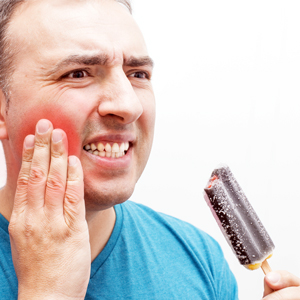SENSITIVE TEETH
Is the taste of ice cream or a sip of hot coffee sometimes a painful experience for you ?

If your teeth hurt when you drink hot or cold beverages, you may have sensitive teeth. This can be the result of tooth decay, fractured teeth, worn fillings, gum disease, worn tooth enamel or an exposed tooth root due to gum recession.
In healthy teeth, a layer of enamel protects the crowns of your teeth—the part above the gum line. Under the gum line a layer called cementum protects the tooth root. Underneath both the enamel and the cementum is dentin. Dentin is less dense than enamel and cementum and contains microscopic tubules (small hollow tubes or canals). When dentin loses its protective covering of enamel or cementum these tubules allow heat and cold or acidic or sticky foods to reach the nerves and cells inside the tooth. Dentin may also be exposed when gums recede. The result can be hypersensitivity.
Sensitive teeth can be treated. The type of treatment will depend on what is causing the sensitivity. We will suggest one of a variety of treatments:
- Desensitizing toothpaste: This contains compounds that help block transmission of sensation from the tooth surface to the nerve, and usually requires several applications before the sensitivity is reduced.
- Fluoride gel: An in-office technique which strengthens tooth enamel and reduces the transmission of sensations.
- A crown, inlay or bonding: These may be used to correct a flaw or decay that results in sensitivity.
- Surgical gum graft: If gum tissue has been lost from the root, this will protect the root and reduce sensitivity.
- Root canal: If sensitivity is severe and persistent and cannot be treated by other means, this treatment may be recommended to eliminate the problem.
Proper oral hygiene is the key to preventing sensitive-tooth pain. We will help in guiding with your daily oral hygiene routine or concerns about tooth sensitivity. Speak with us; let us clear your doubts and help you know more about this procedure!!!
Back to top

